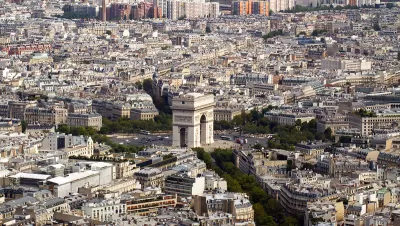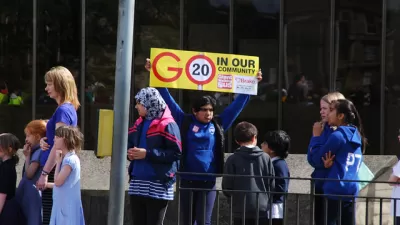A blog post by Eric Britton covers Mayor Madame Anne Hidalgo's plans to adopt a 30 kilometer per hour (approximately 20 miles per hour) maximum speed limit in Paris.

As Angie Schmidt reports, slow-speed zones are gaining traction in cities that want to improve pedestrian safety and enhance livability. Schmidt lists 20 miles per hour zones in New York City, similar adoptions in London with studied benefits, and now Paris for the city in its entirety (minus a few major streets). Schmidt cites Eric Britton's recent blog post as the latest high profile example on this slowing-things-down movement—what Britton calls "slowth."
Britton says that if the city adopts Mayor Madame Anne Hidalgo's plan, the new citywide slow-speed limit will be implemented on all streets except a "small number of major axes into the city and along the two banks of the Seine, where the speed limit will be 50 km/hr, and the city’s hard pressed ring road (périphérique) where the top permissible speed has recently been reduced from 80 to 70 km/hr." Per Britton, in addition to the reduced citywide speed limit, there will be "'meeting zones' (zones de rencontre) spotted around the city in which pedestrians and cyclists have priority but mix with cars which are limited to a top speed of 20 km/hr."
Britton writes that Mayor Hidalgo's idea expands upon "a steady increase in the number of zones reserved for pedestrians only, and more recently a step-by-step movement to “eco-areas” (see http://www.eco-quartiers.fr) where top speeds are already limited to 30 km/hr. By 2013 some 560 kilometers of the city streets were already in such areas, about one third of the total." Britton hopes to see significant results from the reduced speed limit, such as "substantially fewer accidents, significant reduction in serious injuries and deaths…reduced carbon stress on climate, and the long list goes on."
FULL STORY: Paris to limit speeds to 30 km/hr over entire city

Maui's Vacation Rental Debate Turns Ugly
Verbal attacks, misinformation campaigns and fistfights plague a high-stakes debate to convert thousands of vacation rentals into long-term housing.

Planetizen Federal Action Tracker
A weekly monitor of how Trump’s orders and actions are impacting planners and planning in America.

In Urban Planning, AI Prompting Could be the New Design Thinking
Creativity has long been key to great urban design. What if we see AI as our new creative partner?

King County Supportive Housing Program Offers Hope for Unhoused Residents
The county is taking a ‘Housing First’ approach that prioritizes getting people into housing, then offering wraparound supportive services.

Researchers Use AI to Get Clearer Picture of US Housing
Analysts are using artificial intelligence to supercharge their research by allowing them to comb through data faster. Though these AI tools can be error prone, they save time and housing researchers are optimistic about the future.

Making Shared Micromobility More Inclusive
Cities and shared mobility system operators can do more to include people with disabilities in planning and operations, per a new report.
Urban Design for Planners 1: Software Tools
This six-course series explores essential urban design concepts using open source software and equips planners with the tools they need to participate fully in the urban design process.
Planning for Universal Design
Learn the tools for implementing Universal Design in planning regulations.
planning NEXT
Appalachian Highlands Housing Partners
Mpact (founded as Rail~Volution)
City of Camden Redevelopment Agency
City of Astoria
City of Portland
City of Laramie



























